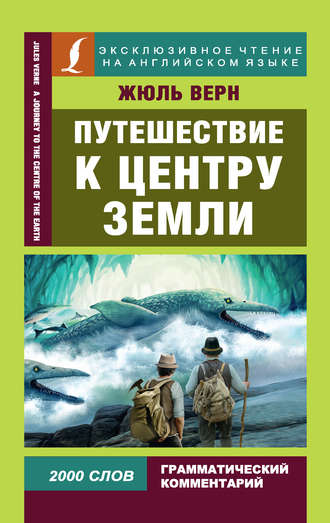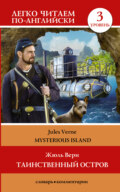
Жюль Верн
Путешествие к центру Земли / A Journey to the Centre of the Earth
5
I replaced the unfortunate document upon the table. Professor Liedenbrock was greatly abstracted. The mystical letters gave him no rest. He sat in his armchair, took the pen and began to write algebraic formulas. For three long hours my uncle worked on without a word, without lifting his head. But time was passing away; night came on; the street noises ceased; my uncle noticed nothing. Martha opened the door and said:
“Will monsieur take any supper tonight?”
But there was no answer. As for me, after long resistance, I began to sleep.
When I awoke next morning the Professor was still working. To tell the plain truth, I pitied him. “No, no,” I repeated, “I shall not speak. He will go at once; nothing on Earth can stop him. His imagination is a volcano, and he will risk his life. I will preserve silence. I will keep the secret which mere chance has revealed to me. To discover it is to kill Professor Liedenbrock! Let him find it out himself if he can.”
I folded my arms and waited. Two o’clock struck. This was becoming ridiculous; worse than that, unbearable. The Professor jumped up, clapped on his hat, and prepared to go out.
“Uncle!” I cried.
He did not hear me.
“Uncle Liedenbrock!” I cried, lifting up my voice.
“Ay,” he answered.
“Uncle, that key!”
“What key? The door key?”
“No, no!” I cried. “The key of the document.”
The Professor stared at me over his spectacles. I nodded my head up and down.
“Yes, that key, chance—”
“What is that you are saying?” he shouted with indescribable emotion.
“There, read that!” I said, presenting a sheet of paper on which I wrote the sentences.
“But there is nothing in this,” he answered.
“No, nothing until you proceed to read from the end to the beginning.”
A new revelation burst in upon the Professor. He was transformed!
“Aha, clever Saknussemm!” he cried. And he read the whole document from the last letter to the first:
In Sneffels Joculis craterem quem delibat
Umbra Scartaris Julii
intra calendas descende,
Audax viator,
et terrestre centrum attinges.
Quod feci, Arne Saknussemm.
Which may be translated thus:
“Descend, bold traveller, into the crater of the Jokul of Sneffels[23], which the shadow of Scartaris [24]touches before the kalends [25]of July, and you will attain the centre of the Earth; which I have done, Arne Saknussemm.”
My uncle sprang very high. He seized his head between both his hands; he pushed the chairs out of their places, he piled up his books. At last his nerves calmed down, and he sank back into his armchair.
“What’s the time?” he asked after a few moments of silence.
“Three o’clock,” I replied.
“Is it really? It’s the dinner-hour! I am half dead with hunger[26]. Come on, and after dinner—”
“Well?”
“After dinner, pack up my trunk.”
“What?” I cried.
“And yours!” replied the indefatigable Professor, entering the dining-room.
6
At these words a cold shiver ran through me. Yet I controlled myself. During all dinner time my uncle was almost merry. After the dessert, he invited me into his study.
I obeyed; he sat at one end of his table, I at the other.
“Axel,” said he very mildly; “you are a very ingenious young man, you have done me a splendid service, when I was going to abandon the contest. Never, my lad, shall I forget it. But I want to preserve the secrecy: you understand? There are people in the scientific world who envy my success.”
“Do you really think there are many people bold enough?” said I.
“Certainly! A whole army of geologists is ready to follow Arne Saknussemm.”
“But, uncle,” I replied; “we have no proof of the authenticity of this document.”
“What! Not of the book, inside which we have discovered it?”
“I admit that Saknussemm wrote these lines. But has he really accomplished such a journey?”
A smile flitted across the lip of my uncle, and he answered:
“That is what we shall see.”
“Ah!” said I. “But let me present all the possible objections against this document.”
“Speak, my boy, don’t be afraid. You are no longer my nephew only, but my colleague.”
“Well, I want to ask what are this ‘Jokul’, this ‘Sneffels’, and this ‘Scartaris’?”
“Nothing easier. I received not long ago a map from my friend. Take that atlas in the second shelf in the large bookcase.”
I rose from my seat and found the required atlas. My uncle opened it and said:
“Here is one of the best maps of Iceland, and I believe this will solve the worst of our difficulties.”
I bent over the map.
“You see this volcanic island?” said the Professor; “All the volcanoes are called jokuls, a word which means glacier in Icelandic.”
“Very good,” said I; “but what of ‘Sneffels’?”
My uncle replied:
“Follow my finger along the west coast of Iceland. Do you see Reykjavik[27], the capital? You do. Well; ascend the innumerable fiords, and stop at the sixty-fifth degree of latitude. What do you see there?”
“I see a peninsula, and a mountain rising out of the sea.”
“Right. That is Sneffels. It is a mountain five thousand feet high, one of the most remarkable in the world, if its crater leads down to the centre of the Earth.”
“But that is impossible,” I disgusted at such a ridiculous supposition.
“Impossible?” said the Professor severely; “and why?”
“Because this crater is evidently filled with lava and burning rocks, and therefore—”
“But suppose it is an extinct volcano[28]?”
“Extinct?”
“Yes; the number of active volcanoes on the surface of the globe is about three hundred. But there is a much larger number of extinct ones. Now, Sneffels is one of these.”
“What is the meaning of this word ‘Scartaris’?”
My uncle took a few minutes to consider.
“What is darkness to you is light to me. One of the peaks is called Scartaris, it flung its shadow down the mouth of that crater. Isn’t it the most exact guide? When we arrive at the summit of Sneffels we shall find the proper road.”
“Well, then,” I said, “I can admit that Saknussemm’s sentence is clear. That learned philosopher got to the bottom of Sneffels, and saw the shadow of Scartaris on the edge of the crater before the kalends of July. But as for performing the journey, and returning, if he ever went, I say no—he never, never did that.”
“And why?” said my uncle ironically.
“All the theories of science demonstrate it.”
“The theories say that, do they?” replied the Professor in the tone of a meek disciple. “Oh! Unpleasant theories! They will not hinder us, won’t they?”
“Yes; it is perfectly well known that the internal temperature rises one degree for every 70 feet in depth; so there must be a temperature of 360,032 degrees at the centre of the Earth. Therefore, all the substances that compose the body of this Earth must exist there in a state of incandescent gas[29].”
“So, Axel, it is the heat that troubles you?”
“Of course it is. If we reach a depth of thirty miles, the temperature will be more than 2372 degrees.”
“This is my decision,” replied Professor Liedenbrock. “Neither you nor anybody else knows with any certainty what is going on in the interior of this globe, since not the twelve thousandth part of its radius is known. Many geologists say that the interior of the globe is neither gas nor water, nor any of the heaviest minerals. You see, Axel, the condition of the terrestrial nucleus is absolutely unknown. There is no proof at all for the internal heat; my opinion is that there is no such thing, it cannot be; besides we shall see for ourselves, and, like Arne Saknussemm, we shall know exactly what is there.”
“Very well, we shall see,” I replied. “Yes, we shall see; that is, if it is possible to see anything there.”
“And why not? But silence, do you hear me? Silence upon the whole subject; tell nobody that we are going to discover the centre of the Earth.”
7
Thus ended our conversation and I came out of my uncle’s study. I made for the banks of the Elbe[30], where the steamer lands its passengers.
“It is quite absurd!” I cried, “There is no sense about it. The whole thing is non-existent.”
I followed the banks of the river and passed the town. I reached the Altona road[31]. Shortly I noticed my little Gräuben; she was bravely returning to Hamburg.
“Gräuben!” I cried.
The young girl stopped. Ten yards more, and I joined her.
“Axel!” she cried surprised. “What! Have you come to meet me? What is the matter?”
“What is the matter, Gräuben?” I cried.
In a couple of minutes my pretty girl was fully informed of everything. For a time she was silent.
At last she said, “Axel!”
“My dear Gräuben.”
“That will be a splendid journey!”
I jumped at these words.
“Yes, Axel, a journey worthy of the nephew of a savant!”
“What, Gräuben, won’t you dissuade me from such an undertaking?”
“No, my dear Axel, and I want to go with you.”
“Is that quite true?”
“It is true.”
Ah! I was disconcerted, and, if I must tell the whole truth, I was ashamed.
“Gräuben, we will see whether you will say the same thing tomorrow.”
“Tomorrow, dear Axel, I will say what I say today.”
After all, I thought, the kalends of July are a long way off, and between this and then many things may take place which will cure my uncle of his desire to travel underground.
It was night when we arrived at the house in Königstrasse.
“Come, Axel, come, you miserable wretch,” my uncle cried when he saw me. “Your boxes are not packed, and my papers are not arranged; where’s the key of my carpet bag?”
My voice failed. Scarcely could my lips utter the words:
“Are we really going?”
“Of course, you unhappy boy! The day after tomorrow, early.”
I could hear no more. I fled for refuge into my own little room.
All hope was now at an end. I spent an awful night. Next morning I woke up early. But could I resist the sweet voice which was always music to my ears, saying, “My dear Axel?”
“Ah! My dear Axel,” said Gräuben. “Your uncle is a bold philosopher, a man of immense courage, and you must remember that his blood flows in your veins. He will no doubt succeed. My dear Axel, it is a grand thing to devote yourself to science!”
Her words revived me. Yet I refused to believe we could start. I drew Gräuben into the Professor’s study.
“Uncle, is it true that we will go?”
“Why do you doubt?”
“Well, I don’t doubt,” I said, not to vex him; “but, I ask, what need is there to hurry?”
“Time, time.”
“But it is only the 16th May, and until the end of June—”
“What, you monument of ignorance! Do you think you can get to Iceland in a couple of days? There is only one trip every month from Copenhagen to Reykjavik, on the 22nd. Therefore we must get to Copenhagen as fast as we can. Go and pack up.”
I went up to my room. Gräuben followed me. She helped me to pack up all things necessary for my voyage. Her little hands moved without haste. Finally I came downstairs.
“Where’s your box?” cried my uncle.
“It is ready,” I replied, with faltering voice.
It was now manifestly impossible to maintain the struggle against destiny.
My pretty Gräuben kissed the Professor.
“Gräuben!” I murmured.
“Go, my dear Axel, go! I am now your betrothed; and when you come back I will be your wife.”
I pressed her in my arms and took my place in the carriage.





